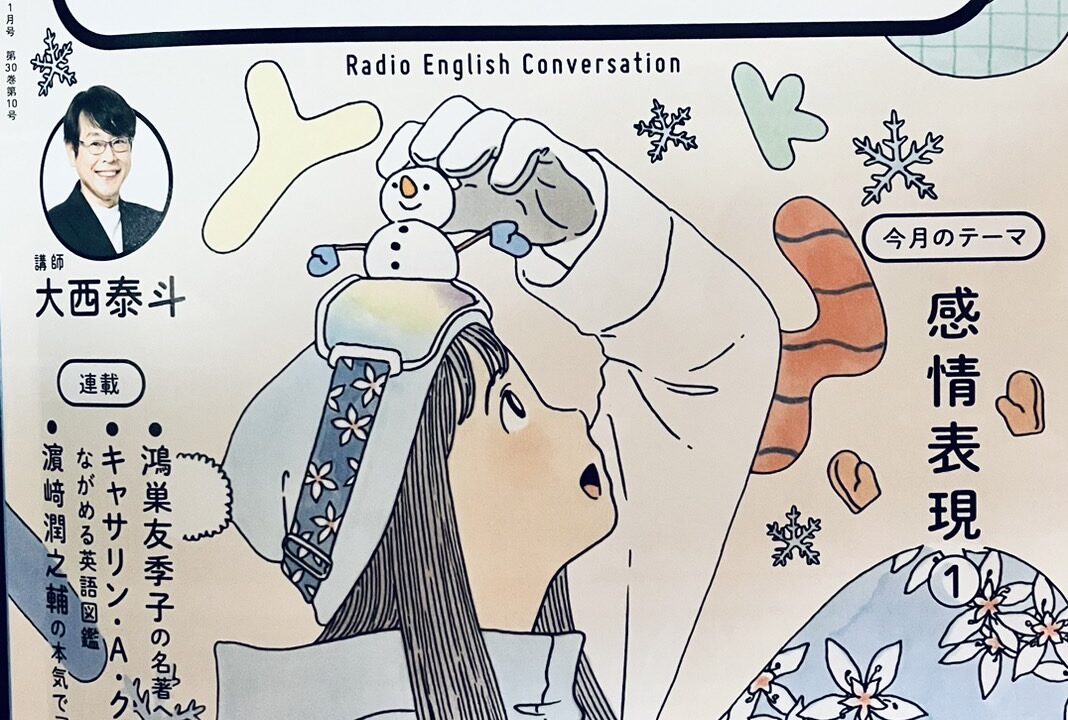【ラジオ英会話】Lesson 183 発言タイプ:感情③「嫌い」を表す1 – 一般的な嫌い – January 10 Wednesday, 2024

January 10 Wednesday, 2024
Lesson 183 発言タイプ:感情③「嫌い」を表す1 – 一般的な嫌い
☆Words & Phrases
**take off:
Doug, our eco-tourism business is really taking off!
**abroad:
And we’re getting lots of customers from abroad.
**post:
**effective:
I guess my posts in English were effective.
**make a big difference:
Yes, they made a big difference.
I’ll make dinner tonight. What would you like?
**Okinawan:
Goya champuru. – The Okinawan dish? You like it?

☆Grammar and Vocabulary
① I didn’t realize so many people wanted to visit our island.
realize のイメージ
realize は「気がつく・明確に理解する」といったこの文で使われた意味のほかにも「実現する」という意味でも使われる
それはこの動詞が「今まで漠然としていたものがクッキリと形を成す」というイメージを持っているため
よく理解できていなかったことが頭の中で「クッキリ」したら「気がつく」になり、プランにすぎないものが「クッキリ」と形をとれば「実現する」となる
いろいろな日本語訳に対応する単語は「イメージ(表現の持つ中核的な意味)」を理解すると使いこなすことができる
② I guess my posts in English were effective.
リポート文
この文全体の形は「リポート文」。リポート文は、主語の発言・思考・感情・知識を表す、基本文型に劣らずの頻度を誇る形
作り方は簡単。動詞(句)の後ろに節(文中で使われる「小さな文」)を並べるだけ
この例文では guess の後ろの節が「何を思っているのか?」の思考内容を説明している
この形は「説明ルール: 説明は後ろに置く」が作り出す代表的な形のひとつ
友だち追加でLINEにラジオ英会話で学んだフレーズを実際のビジネスシーンで使うための方法、そして放送のまとめが届きます。
☆Typical Expressions
Goya isn’t really my cup of tea.
my cup of tea は「好きなもの・得意なもの」ということ
紅茶には好みがあるため好き嫌いは分かれる、それがこの表現につながっている
この文では not really が使われ「それほど好きではない」とソフトな意味となっている
① I don’t like dogs.
[I dislike dogs.]
I hate dogs.
→「嫌い」を意味する一般的な表現
dislike はかたい表現で会話ではあまり使われない
hate は「大嫌い」と強い嫌悪感を表すが、会話では軽く使われることが多い単語
③ That’s bad.
That’s terrible.
That’s awful.
That’s vile.
→「私は〜が嫌い」と言う代わりに「それは悪い・ひどい」とすることも可能
vile は「非常に不快な」
② I can’t stand the stress.
I can’t bear the stress.
→ stand / bear は重みに耐えて「立っている/運んでいる」イメージから「耐える・我慢する」という意味で使うことができる
can’t stand [bear] で「我慢できない・嫌い」
④ That’s not for me.
That’s not really my thing.
→「向いていない・得意ではない」は、婉曲的に「したくない・好まない」を表すことのできる表現
★Practice
D: Okay. Today’s practice is about when we don’t like something. Just like with affection, there are levels and layers to expressing how much we don’t like something. So, try to find the word that’s most appropriate to match your emotion, and also the situation that you’re in.
R: Ready to practice?
D: Here’s our first,
– I don’t like dogs.
– I dislike dogs.
“Dislike” is a word that’s more common in written than spoken. But it’s good to remember. And here’s one more,
– I hate dogs.
R: Let’s continue,
– I can’t stand the stress.
And one more version,
– I can’t bear the stress.
D: All right. Let’s keep going!
– That’s bad.
– That’s terrible.
– That’s awful.
– That’s vile.
R: Okay. And these last two are soft ways for expressing “dislike.” Let’s try them together,
– That’s not for me.
– That’s not really my thing.
D: Great work, everyone!
R: Excellent.
☆Typical Expressions in Action
①ハイキングはそれほど好みではありません。私はどちらかと言うとイ ンドア派なのです。
**more of +名詞:
②どこかもっと静かなところに行かない?ここの騒音は耐えられません。
**somewhere:
③もしローラーコースターに乗りたいなら、それでいいですよ。私はここで待ちます。得意じゃないんです。
★Ending
O: Hey guys. Is there anything you hate to eat?
D: Brussels sprouts.
R: No!! I love brussels sprouts. They are so delicious. I’ll take all your brussels sprouts.
D: You have them.
O: Ah ~, sorry. What’s that?
**brussels sprouts:
January 10 Wednesday, 2024
Lesson 183 発言タイプ:感情③「嫌い」を表す1 – 一般的な嫌い
(日本語訳・解説付き)
☆Words & Phrases
**take off:(仕事などが)軌道に乗る
Doug, our eco-tourism business is really taking off!
ダグ、私たちのエコツアービジネス、本当に軌道に乗ってきました!
※ take off は飛行機が離陸する🛫のと同じイメージです!
**abroad: 国外へ、海外へ
And we’re getting lots of customers from abroad.
それに、私たちは外国からのお客さんもたくさん得ています=外国からのお客さんもたくさん来ています。
**post: 投稿する
**effective: 効力のある、有効な
I guess my posts in English were effective.
私の英語での投稿が効果的であったのだと思います。
**make a big difference: 大きな影響を及ぼす
Yes, they made a big difference.
はい、それらは大きな影響を及ぼしました=その効果はとても大きかったです。
※ difference を「相違点」などのように単語一つを覚えてもなかなか英会話では使えません。make a big different のようにぜひフレーズで覚えておきましょう!
I’ll make dinner tonight. What would you like?
今夜は私が夕食を作ります。何が食べたいですか?
※What would you like to eat? の to eat が省略されてます!
**Okinawan: 沖縄の
Goya champuru. – The Okinawan dish? You like it?
ゴーヤチャンプルー – 沖縄料理の?あなたはそれが好きなの?
※ Okinawan は Okinawa の形容詞です!

☆Grammar and Vocabulary
① I didn’t realize so many people wanted to visit our island.
私は、これほど多くの人たちが私たちの島に来たがっていることに気づいていませんでした。
realize のイメージ
realize は「気がつく・明確に理解する」といったこの文で使われた意味のほかにも「実現する」という意味でも使われる
それはこの動詞が「今まで漠然としていたものがクッキリと形を成す」というイメージを持っているため
よく理解できていなかったことが頭の中で「クッキリ」したら「気がつく」になり、プランにすぎないものが「クッキリ」と形をとれば「実現する」となる
いろいろな日本語訳に対応する単語は「イメージ(表現の持つ中核的な意味)」を理解すると使いこなすことができる
② I guess my posts in English were effective.
私の英語での投稿が効果的であったのだと思います。
リポート文
この文全体の形は「リポート文」。リポート文は、主語の発言・思考・感情・知識を表す、基本文型に劣らずの頻度を誇る形
作り方は簡単。動詞(句)の後ろに節(文中で使われる「小さな文」)を並べるだけ
この例文では guess の後ろの節が「何を思っているのか?」の思考内容を説明している
この形は「説明ルール: 説明は後ろに置く」が作り出す代表的な形のひとつ
友だち追加でLINEにラジオ英会話で学んだフレーズを実際のビジネスシーンで使うための方法、そして放送のまとめが届きます。
☆Typical Expressions
Goya isn’t really my cup of tea.
私はあまりゴーヤが好みではありません。
my cup of tea は「好きなもの・得意なもの」ということ
紅茶には好みがあるため好き嫌いは分かれる、それがこの表現につながっている
この文では not really が使われ「それほど好きではない」とソフトな意味となっている
① I don’t like dogs.
[I dislike dogs.]
私はイヌが好きではない
I hate dogs.
私はイヌが大嫌い
→「嫌い」を意味する一般的な表現
dislike はかたい表現で会話ではあまり使われない
hate は「大嫌い」と強い嫌悪感を表すが、会話では軽く使われることが多い単語
③ That’s bad.
That’s terrible.
That’s awful.
That’s vile.
それはひどいね
→「私は〜が嫌い」と言う代わりに「それは悪い・ひどい」とすることも可能
vile は「非常に不快な」
② I can’t stand the stress.
I can’t bear the stress.
私はそのストレスに我慢できません(=嫌い)
→ stand / bear は重みに耐えて「立っている/運んでいる」イメージから「耐える・我慢する」という意味で使うことができる
can’t stand [bear] で「我慢できない・嫌い」
④ That’s not for me.
それは、私には向いていません。
That’s not really my thing.
それは、私はそれほど得意ではありません。
→「向いていない・得意ではない」は、婉曲的に「したくない・好まない」を表すことのできる表現
★Practice
D: Okay. Today’s practice is about when we don’t like something. Just like with affection, there are levels and layers to expressing how much we don’t like something. So, try to find the word that’s most appropriate to match your emotion, and also the situation that you’re in.
R: Ready to practice?
D: Here’s our first,
– I don’t like dogs.
– I dislike dogs.
“Dislike” is a word that’s more common in written than spoken. But it’s good to remember. And here’s one more,
– I hate dogs.
R: Let’s continue,
– I can’t stand the stress.
And one more version,
– I can’t bear the stress.
D: All right. Let’s keep going!
– That’s bad.
– That’s terrible.
– That’s awful.
– That’s vile.
R: Okay. And these last two are soft ways for expressing “dislike.” Let’s try them together,
– That’s not for me.
– That’s not really my thing.
D: Great work, everyone!
R: Excellent.
☆Typical Expressions in Action
①ハイキングはそれほど好みではありません。私はどちらかと言うとイ ンドア派なのです。
Hiking isn’t really my cup of tea. I’m more of an indoor person.
**more of +名詞: どちらかと言うと〜だ
※比較の than を加え more of ~ than…(…というよりも〜だ)の形もよく使われます!
②どこかもっと静かなところに行かない?ここの騒音は耐えられません。
Can we go somewhere quieter? I can’t stand the noise here.
**somewhere: どこか
③もしローラーコースターに乗りたいなら、それでいいですよ。私はここで待ちます。得意じゃないんです。
If you want to ride the roller coaster, that’s fine. I’ll wait here. They’re not for me.
★Ending
O: Hey guys. Is there anything you hate to eat?
D: Brussels sprouts.
R: No!! I love brussels sprouts. They are so delicious. I’ll take all your brussels sprouts.
D: You have them.
O: Ah ~, sorry. What’s that?
**brussels sprouts: 芽キャベツ
名古屋駅前にあるビジネス英語&仕事での英語雑談力をつけるための「名古屋BEGビジネス英会話ジム」
営業時間:平日 9:00~22:00 土曜日 9:00~19:00(日祝休み)
〒450-0002 愛知県名古屋市中村区名駅2丁目40-16 名駅野村ビル 5階



